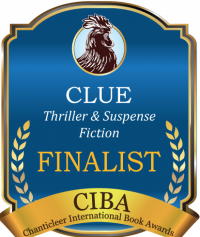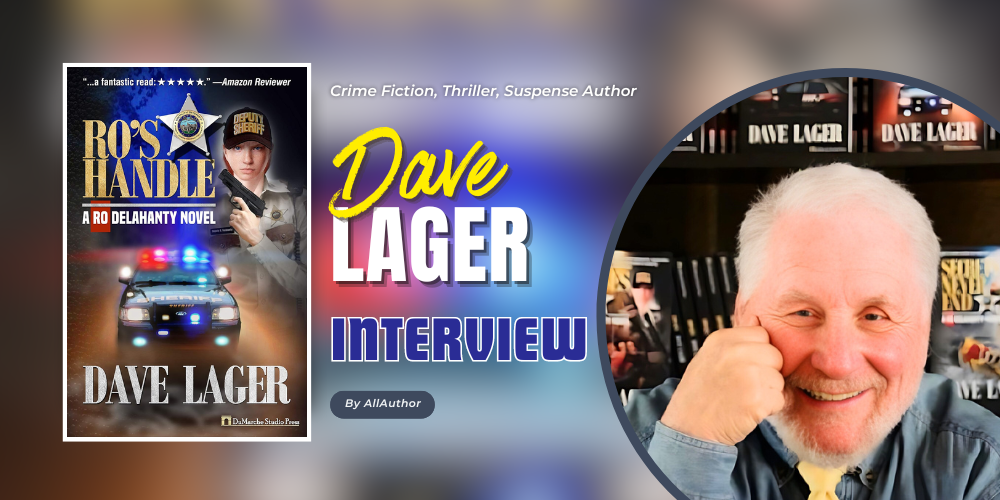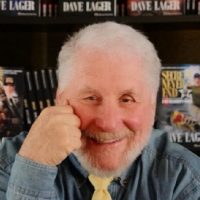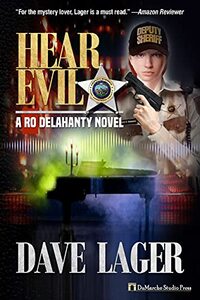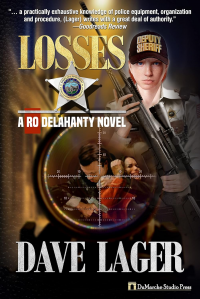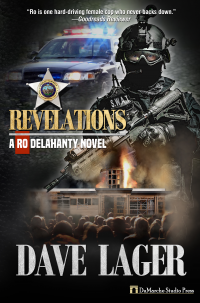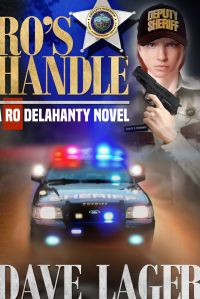Where have you spent most of your childhood?
I grew up in Oak Park, Illinois, a near west suburb of Chicago. I graduated from Oak Park / River Forest High School and then went off to college at Western Illinois University, Macomb. Oak Park was the birthplace of Ernest Hemingway, and Frank Lloyd Wright had a studio there, so I like to think we might share some spiritual connection.
What inspired you to create the character Ro Delahanty, and how did she evolve over the course of the series?
Over the years I would take a whack at writing a novel – one was a fantasy, and one was a mid-1900s crime novel. I would complete a couple dozen chapters, but life would get in the way and the project was put up on the shelf and forgotten. When I retired fifteen years ago, I decided I wanted to get serious about fulfilling a childhood dream of being a novelist.
Which brings me to Ro Delahanty. I have always liked strong female characters: Sarah Connor (of Terminator fame), Ellen Ripley (from the Alien series), and Katniss Everdeen (The Hunger Games heroine). Ro Delahanty is in that tradition.
So, my lead character to be a female, as there are tons of novels out there with male leads. I wanted her to be an ordinary street cop (a deputy sheriff in a semi-rural county), as there were plenty of FBI agents and big city PIs out there. And, I wanted her to be a real person, have faults, personal conflicts, not be a superhero, although I did want her to be heroic at heart.
I wrote the first novel, Ro’s Handle, but then something interesting happened… My character took over. I like to now tell people, “I’m not writing the novels anymore, I’m taking dictation from Ro.”
Over the course of five additional published novels in the Ro Delahanty Series – Hear Evil, Losses, Secrets Never End, Sniper’s Day, and Revelations – she has evolved from a cop who tended to see the world in black and white, good guys vs. bad guys, to someone who appreciates the many shades of gray we all must live with to keep our balance in life.
Can you share the journey behind writing your first Ro Delahanty novel, "Ro’s Handle"? What challenges did you face?
Writing Ro’s Handle turned out to be easier than I thought. I always knew it would be a series, so I undertook Ro’s Handle with the understanding it was going to introduce my character. That meant, first, there were certain elements of her personality I knew had to be included, or at least hinted at, and second, certain additional characters needed to be introduced, because they would become crucial in future books.
What’s more, I knew what the ending (a shootout) would be, so I was guided by that, each chapter I wrote had to logically move the story toward that ending in some way.
How did it feel to have "Ro’s Handle," "Hear Evil," "Losses," and "Secrets Never End" win First Place in the Thriller/Suspense Series category at the 2023 Chanticleer International Book Awards?
Overwhelmed… Nancy, my wife, was with me. We were sitting at a table with other authors and their companions. Each winner was announced verbally as well as being flashed up on a big screen behind the podium. When they announced that the winner of a first-place ribbon for the best thriller / suspense series was the “The Ro Delahanty Series,” it took me a second or two to realize, “Oh, my gosh, that’s me!”
How did I feel? I always believed in my heart my stories were good ones. But to have professional judges who have probably read hundreds of novels over the years say, “This guy has done some really good writing,” well, that was wonderful validation.
What themes or messages do you aim to convey through the Ro Delahanty series?
The number one theme is “You have to be true to yourself.” Ro Delahanty faces a great many moral and philosophical dilemmas in both her professional and personal life, but she always ends up listening to her gut.
Another major theme is how money and/or ambition can corrupt even the most well-meaning.
Yet another is that love can take many forms – Ro has family, friends, lovers, all of whom she “loves” but in different ways.
Oh, and Ro also “loves” two inanimate objects: A 250+ year old tree in a state park where she goes for her runs, and a three-foot tall teddy bear she’s had since childhood named Peter Panda. Both are important characters in the Ro novels.
How do you balance creating suspense and maintaining character development in your novels?
Many years ago, before I started the Ro novels, my mother, who was an inveterate reader, once told me that she loved it when characters had conversations, it’s what she looked forward to in a novel – I never forgot that.
Obviously, when Ro is involved in some physical combat or a shootout, description prevails. But a majority of my chapters consist of conversations between the characters, conversations in which they reveal things about themselves or about their world that develops them as unique personalities, but also reveals elements of plot lines that create suspense.
Can you describe your writing process? Do you follow a specific routine or method?
I believe it was Joyce Carol Oates who said (I’m paraphrasing), “You can’t write the first sentence until you’ve written the last sentence.” When I start thinking about a novel, I always have the end in mind. I then write a series of brief (two or three sentences) descriptions of the various chapters that I think would be necessary to get to that end. This Chapter Outline is very fluid; chapters might be moved around or eliminated; new chapters might be added; timelines might be altered.
I then write drafts of the full chapters using this Chapter Outline. Most of the time they are written in sequence, but that is not always true. The draft chapters are edited, and are eventually merged into a full manuscript, which is again edited multiple times. Beta readers and my editor then read this manuscript and further editing is based on their input.
As the novels have progressed, I find I am becoming more of a planner in my writing, needing to keep track of who said or did what in previous chapters and when.
My best writing time is early in the morning – sometimes as early as 3 a.m. I can write for about three hours, producing a thousand to two thousand words, but after that, I’m forcing it, which is not good. My habit is to quit writing in the middle of a chapter, so that the next day I have a place to start.
What can readers expect from your latest release, "Revelations," and how does it differ from the previous books in the series?
In earlier novels, various aspects about the antagonist – it is an ostensibly legitimate business that could have a dark side – have been hinted at. In “Revelations,” I include numerous flashbacks that “reveal” how the specific individuals in this business “went bad.” In other words, the readers knows all about how crooked they are, the suspense in “Revelations” is how my lead character, Ro Delahanty, driven by a need to uncover these secrets, makes a major decision about her life.
What inspired the titles of your novels, and how do they reflect the storylines?
“Ro’s Handle” is how Ro earns the acceptance and respect of her fellow deputies as a cop by being given a complimentary nickname or deputy’s handle.
“Hear Evil” delves into the supernatural, exploring the question, “Can music itself become evil?” The conflict is that this question involves a beloved member of her family.
The main conflicts in “Losses” revolve around personal losses that Ro suffers.
“Secrets Never End” is about the secrets we live with, the secrets we don’t tell others, the secrets we even hide from ourselves.
“Sniper’s Day” is about a to-the-death duel between Ro Delahanty, a SWAT designated marksman, and a trained military sniper gone rogue.
“Revelations” is about the revelations mentioned above, which leads to “Mourning Dove”…
How do you conduct research for your thriller/suspense novels, particularly regarding police procedures and criminal investigations?
On the Internet… My best sources are from law enforcement related blogs and articles, plus various government reports – it’s amazing how much information is out there.
In every novel I put Ro into some “cop situation” that I create. I then go online to find out if this made-up situation is plausible for a cop. What I usually discover is something happened in real life that is even more bizarre than what I imagined – truth, indeed, can be stranger than fiction.
Can you share any insights or teasers about the upcoming book, "Mourning Dove"?
“Mourning Dove,” is still being written, with a projected publication in 2025...
“Mourning Dove” is Ro’s code name as an undercover operative (she’s still a cop) who has infiltrated the antagonist’s vast illegal drug smuggling and money laundering operation. But she is seduced by the seemingly limitless amounts of available drug money, the excitement of living outside the law, and the easy sex. The central conflict in “Mourning Dove” is can Ro Delahanty, once a straight up cop, come back from this foray into the dark side of her personality?
How has your career in journalism and marketing influenced your fiction writing?
My writing style tends to be “journalism-ish,” that is, I use mostly brief sentences that move along quickly, include lots of action verbs, and have only brief descriptive passages, because…
For most of my adult life I made my living as a writer, but it was always in the non-fiction world: newspaper reporter / editor, writing news releases or marketing plans for my clients. I write my novels under the pen name, Dave Lager. But I have previously published several books for the small business market under my given name, Dave Ramacitti.
Besides the writing style mentioned above, the biggest influence of those previous experiences is I am a disciplined writer, I am at my keyboard every day, writing.
What advice would you give to aspiring authors who want to write in the thriller/suspense genre?
Write, write, write! It’s like any talent – becoming good at playing basketball or the piano – practice is everything.
Read, read, read! Experience as many different writers as you can in your genre, particularly the successful ones. Decide what you like and don’t like about them…
So that you eventually find your own voice.
How do you handle writer’s block or periods of creative stagnation?
Writing is second nature for me; I know that writer’s block is a real thing for some, but I have never experienced it.
How long have you been associated with AllAuthor? How has your experience been?
I have only been a member for a few months and am still learning about its features and resources.


